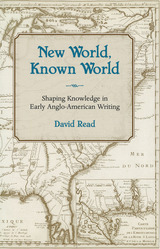2 books about 1604?-1683

David Read
University of Missouri Press
New World, Known World examines the works of four writers closely associated with the early period of English colonization, from 1624 to 1649: John Smith’s Generall Historie of Virginia, William Bradford’s Of Plymouth Plantation, Thomas Morton’s New English Canaan, and Roger Williams’s A Key into the Language of America (in conjunction with another of Williams’s major works, The Bloudy Tenent of Persecution). David Read addresses these texts as examples of what he refers to as “individual knowledge projects”— the writers’ attempts to shape raw information and experience into patterns and narratives that can be compared with and assessed against others from a given society’s fund of accepted knowledge.
Read argues that the body of Western knowledge in the period immediately before the development of well-defined scientific disciplines is primarily the work of individuals functioning in relative isolation, rather than institutions working in concert. The European colonization of other regions in the same period exposes in a way few historical situations do both the complexity and the uncertainty involved in the task of producing knowledge.
Read treats each work as the project of a specific mind, reflecting a high degree of intentionality and design, and not simply as a collection of documentary evidence to be culled in the service of a large-scale argument. He shows that each author adds a distinct voice to the experience of North American colonization and that each articulates it in ways that are open to analysis in terms of form, style, convention, rhetorical strategies, and applications of metaphor and allegory.
By applying the tools of literary interpretation to colonial texts, Read reaches a fuller understanding of the immediate consequences of English colonization in North America on the culture’s base of knowledge. Students and scholars of early modern colonialism and transatlantic studies, as well as those with interests in seventeenth-century American and English literature, should find this book of particular value.
[more]

Separating Church and State
ROGER WILLIAMS AND RELIGIOUS LIBERTY
Timothy L. Hall
University of Illinois Press, 1998
Roger Williams, founder of the colony of Rhode Island, is famous as an
apostle of religious tolerance and a foe of religious establishments.
In Separating Church and State, Timothy Hall combines impressive
historical and legal scholarship to explore Williams's theory of religious
liberty and relate it to current debate. Williams's fierce religious dogmaticism,
Hall argues, is precisely what led to his religious tolerance, making
him one of the most articulate champions of the argument for the necessary
separation of church and state.
"Both timely and provocative. . . . Offers Williams's largely overlooked
but deeply important perspective on the peaceful coexistence of committed
believers of diverse faiths. The book also brings into question crucial
tenets of the United States Supreme Court's First Amendment religion clause
jurisprudence at a time when many are raising questions about it."
-- Marci A. Hamilton, Benjamin N. Cardozo School of Law, New York City
"Hall has the entire Williams corpus under his command, and he plays
the relevant texts like a master organist. He also has the legal corpus
equally at his fingertips. One of the great strengths of his book is that
it bridges the too often separate fields of history and jurisprudence."
-- Edwin Gaustad, author of Liberty of Conscience: Roger Williams in
America
apostle of religious tolerance and a foe of religious establishments.
In Separating Church and State, Timothy Hall combines impressive
historical and legal scholarship to explore Williams's theory of religious
liberty and relate it to current debate. Williams's fierce religious dogmaticism,
Hall argues, is precisely what led to his religious tolerance, making
him one of the most articulate champions of the argument for the necessary
separation of church and state.
"Both timely and provocative. . . . Offers Williams's largely overlooked
but deeply important perspective on the peaceful coexistence of committed
believers of diverse faiths. The book also brings into question crucial
tenets of the United States Supreme Court's First Amendment religion clause
jurisprudence at a time when many are raising questions about it."
-- Marci A. Hamilton, Benjamin N. Cardozo School of Law, New York City
"Hall has the entire Williams corpus under his command, and he plays
the relevant texts like a master organist. He also has the legal corpus
equally at his fingertips. One of the great strengths of his book is that
it bridges the too often separate fields of history and jurisprudence."
-- Edwin Gaustad, author of Liberty of Conscience: Roger Williams in
America
[more]
READERS
Browse our collection.
PUBLISHERS
See BiblioVault's publisher services.
STUDENT SERVICES
Files for college accessibility offices.
UChicago Accessibility Resources
home | accessibility | search | about | contact us
BiblioVault ® 2001 - 2024
The University of Chicago Press









